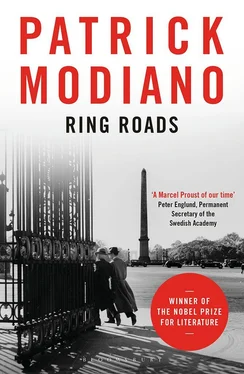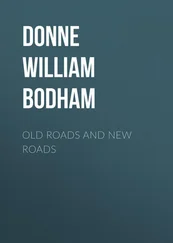Patrick Modiano - Ring Roads
Здесь есть возможность читать онлайн «Patrick Modiano - Ring Roads» весь текст электронной книги совершенно бесплатно (целиком полную версию без сокращений). В некоторых случаях можно слушать аудио, скачать через торрент в формате fb2 и присутствует краткое содержание. Год выпуска: 2015, Издательство: Bloomsbury Paperbacks, Жанр: Современная проза, на английском языке. Описание произведения, (предисловие) а так же отзывы посетителей доступны на портале библиотеки ЛибКат.
- Название:Ring Roads
- Автор:
- Издательство:Bloomsbury Paperbacks
- Жанр:
- Год:2015
- ISBN:нет данных
- Рейтинг книги:3 / 5. Голосов: 1
-
Избранное:Добавить в избранное
- Отзывы:
-
Ваша оценка:
- 60
- 1
- 2
- 3
- 4
- 5
Ring Roads: краткое содержание, описание и аннотация
Предлагаем к чтению аннотацию, описание, краткое содержание или предисловие (зависит от того, что написал сам автор книги «Ring Roads»). Если вы не нашли необходимую информацию о книге — напишите в комментариях, мы постараемся отыскать её.
The Night Watch
Ring Roads — читать онлайн бесплатно полную книгу (весь текст) целиком
Ниже представлен текст книги, разбитый по страницам. Система сохранения места последней прочитанной страницы, позволяет с удобством читать онлайн бесплатно книгу «Ring Roads», без необходимости каждый раз заново искать на чём Вы остановились. Поставьте закладку, и сможете в любой момент перейти на страницу, на которой закончили чтение.
Интервал:
Закладка:
On the second page, the ‘Rumour & Innuendo’ column. Paragraphs with suggestive titles. One Robert Lestandi makes scabrous comments about public figures in politics, the arts and the entertainment world and makes oblique remarks that are tantamount to blackmail. Some ‘humorous’ cartoons, in a sinister style, are signed by a certain ‘Mr Tempestuous’. There are more surprises to come. The ‘editorial’, and ‘news’ items, not to mention the readers’ letters. The ‘editorial’ of number 57, a torrent of invective and threats penned by François Gerbère contains such phrases as: ‘It is only one short step from flunkey to thief.’ Or ‘Someone should pay for this. And pay they shall!’ Pay for what? ‘François Gerbère’ is none too precise. As for the various ‘reporters’, they favour the most unsavoury subjects. Issue 51, for instance, offers: ‘The true-life odyssey of a coloured girl through the world of dance and pleasure. Paris, Marseilles, Berlin.’ The same deplorable tone continues in the ‘readers’ letters’ where one reader asks whether ‘Spanish fly added to food or drink will cause instant surrender in a person of the weaker sex’. Jo-Germain answers these questions in fragrant prose.
In the last two pages, entitled ‘What’s New?’, an anonymous ‘Monsieur Tout-Paris’ gives a detailed account of the murky goings-on in society. Society? Which ‘society’ are we talking about? The re-opening of the Jane Stick cabaret club, in the Rue de Ponthieu (the most ‘Parisian’ event of the month according to the columnist), ‘we spotted Osvaldo Valenti and Monique Joyce’. Among the other ‘celebrities listed by ‘Monsieur Tout-Paris’: Countess Tchernicheff, Mag Fontanges, Violette Morriss; ‘Boissel, the author of Croix de Sang , Costantini, the crack pilot; Darquier de Pellepoix, the well-known lawyer; Montandon, the professor of anthropology; Malou Guérin; Delvale and Lionel de Wiet, theatre directors; the journalists Suaraize, Maulaz and Alin-Laubreaux’. But, according to our correspondent, ‘the liveliest table was that of M. Jean Murraille’. To illustrate the point, there is a photograph showing Murraille, Marcheret, the red-haired woman in jodhpurs (her name is Sylviane Quimphe), and my father, whose name is given as ‘Baron Deyckecaire’. ‘All of them’ — says the writer — ‘bring the warmth and spirituality of sophisticated Paris nightlife to Jane Stick.’ Two other photographs give a panoramic view of the evening. Soft lighting, tables occupied by a hundred or so men in dinner-jackets and women with plunging dresses. The first photograph is captioned: ‘The stage is set, the curtains part, the floor vanishes and a staircase, decked with dancers, appears. . The revue Dans notre miroir begins’, the second is captioned ‘Sophistication! Rhythm! Light! Now, that’s Paris!’ No. There’s something suspicious about the whole thing. Who are these people? Where have they sprung from? The fat-faced ‘Baron’ Deyckecaire, in the background there, for example, slumped behind a champagne bucket?
‘You find it interesting?’
In the faded photograph, a middle-aged man stands opposite a young man whose features are indistinct. I looked up. He was standing in front of me: I hadn’t heard him emerge from the depths of those ‘troubled’ years long ago. He glanced down at the ‘What’s New?’ section to see what I was reading. It was true he had caught me poring over the magazine as though inspecting a rare stamp.
‘Are you interested in society goings-on?’
‘Not particularly, monsieur,’ I mumbled.
He held out his hand.
‘Jean Murraille!’
I got to me feet and made a show of being surprised.
‘So, you’re the editor of. .’
‘The very same.’
‘Delighted to meet you!’ I said, off the top of my head. Then, with an effort — ‘I like your magazine very much.’
‘Really?’
He was smiling. I said:
‘It’s cool.’
He seemed surprised by this slangy term I had deliberately used to establish a complicity between us.
‘Your magazine, it’s cool,’ I repeated pensively.
‘Are you in the trade?’
‘No.’
He waited for me to elaborate, but I said nothing.
‘Cigarette?’
He took a platinum lighter from his pocket and opened it with a curt flick. His cigarette drooped from the corner of his mouth, as it droops there for all eternity.
Hesitantly:
‘You read Gerbère’s editorial? Perhaps you don’t agree with the. . political. . views of the magazine?’
‘Politics are not my game,’ I replied.
‘I ask. .’ he smiled ‘. .because I would be curious to know the opinion of a young man. .’
‘Thank you.’
‘I had no difficulty in finding contributors. . we work as a close team. Journalists came running from all sides. . Lestandi, Jo-Germain, Alin-Laubreaux, Gerbère, Georges-Anquetil. . I don’t much care for politics myself. They’re a bore!’ A quick laugh. ‘What the public wants is gossip and topical pieces. And photographs! Particularly photographs! I chose a formula that would be. . joyful!’
‘People need to loosen up “in these troubled times”,’ I said.
‘Absolutely!’
I took a deep breath. In a clipped voice:
‘What I like best in your magazine, is Lestandi’s “Rumour & Innuendo” column. Excellent! Very acerbic!’
‘Lestandi is a remarkable fellow. We worked together in the past, on Dubarry’s La Volontei. An excellent training ground! What do you do?’
The question caught me off guard. He stared at me with his pale blue eyes and I understood that I had to answer quickly to avoid an unbearably awkward moment for us both.
‘Me? Believe it or not I’m a novelist in my spare time.’
The ease with which the phrase came startled me.
‘That’s very, very interesting! Published?’
‘Two stories in a Belgian magazine, last year.’
‘Are you on holiday here?’
He asked the question abruptly, as if suddenly suspicious.
‘Yes.’
I was about to add that we had already seen each other in the bar and in the dining-room.
‘Quiet, isn’t it?’ He pulled nervously on his cigarette. ‘I’ve bought a house on the edge of the forest. Do you live in Paris?’
‘Yes.’
‘So, apart from your literary activities. .’ he stressed the word ‘literary’, and I detected a note of irony — ‘. .do you have a regular job?’
‘No. It’s a little difficult just now.’
‘Strange times. I wonder how it will all end. What do you think?’
‘We must make the most of life while we can.’
This remark pleased him. He roared with laughter.
‘Make hay while the sun shines!’ He patted me on the shoulder, ‘Look here, you must have dinner with me tonight!’
We had walked a little way into the garden. To keep the conversation going, I remarked that it had been very mild these last few afternoons, and that I had one of the pleasantest rooms in the inn, one of the ones that opened directly on to the veranda.
I mentioned that the Clos-Foucré reminded me of my childhood, that I often went there with my father. I asked him if he liked his house. He would have liked to spend more time here, but the magazine monopolized his time. But he liked to keep at it. And Paris could be very pleasant too. With these fascinating remarks, we sat down at one of the tables. Seen from the garden, the inn had a rustic, opulent air, and I didn’t miss the opportunity of telling him so. The manageress (he called her Maud) was a very old friend, he told me. It was she who advised him to buy the house. I would have liked to ask more about her, but I was afraid my curiosity might arouse his suspicion.
For some time now I had been thinking of various ways I might get in touch with them. First I thought of the red-haired woman. Our eyes had met more than once. It would have been easy to get into conversation with Marcheret by sitting next to him at the bar; conversely, impossible to confront my father directly because of his mistrustful nature. And Murraille scared me. How to approach him tactfully? Now he solved the problem himself, after all. An idea occurred to me. Suppose he had made the first move to find out what I was up to? Perhaps he’d noticed the keen interest I had taken in his little group these past three weeks, the way I was intent on their every movement, on every word they spoke in the bar or the dining-room? I remembered the derisive way I’d been told, when I wanted to become a policeman: ‘You’ll never make a good cop, son. Whenever you’re watching or eavesdropping, you give yourself away. You’re a complete innocent.’
Читать дальшеИнтервал:
Закладка:
Похожие книги на «Ring Roads»
Представляем Вашему вниманию похожие книги на «Ring Roads» списком для выбора. Мы отобрали схожую по названию и смыслу литературу в надежде предоставить читателям больше вариантов отыскать новые, интересные, ещё непрочитанные произведения.
Обсуждение, отзывы о книге «Ring Roads» и просто собственные мнения читателей. Оставьте ваши комментарии, напишите, что Вы думаете о произведении, его смысле или главных героях. Укажите что конкретно понравилось, а что нет, и почему Вы так считаете.












